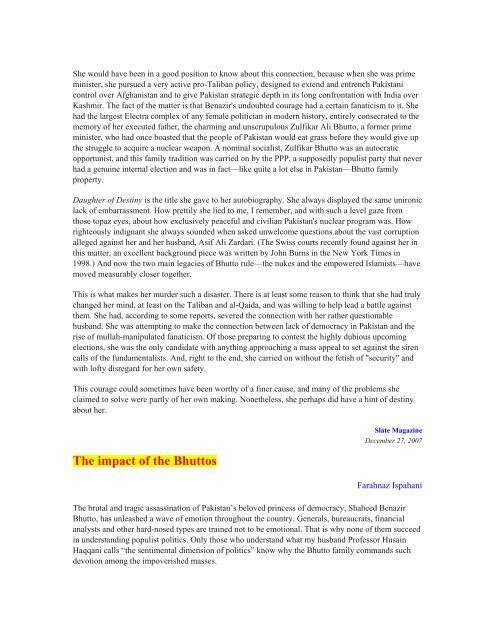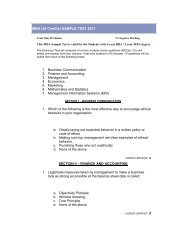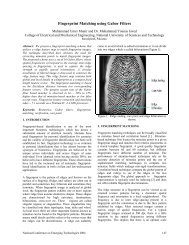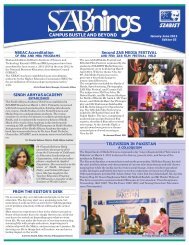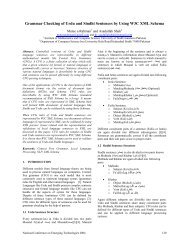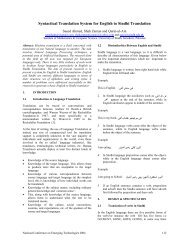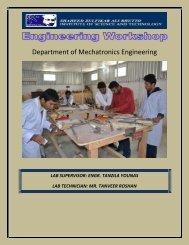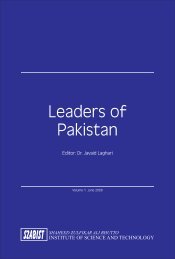Benazir Bhutto - SZABIST
Benazir Bhutto - SZABIST
Benazir Bhutto - SZABIST
Create successful ePaper yourself
Turn your PDF publications into a flip-book with our unique Google optimized e-Paper software.
She would have been in a good position to know about this connection, because when she was prime<br />
minister, she pursued a very active pro-Taliban policy, designed to extend and entrench Pakistani<br />
control over Afghanistan and to give Pakistan strategic depth in its long confrontation with India over<br />
Kashmir. The fact of the matter is that <strong>Benazir</strong>'s undoubted courage had a certain fanaticism to it. She<br />
had the largest Electra complex of any female politician in modern history, entirely consecrated to the<br />
memory of her executed father, the charming and unscrupulous Zulfikar Ali <strong>Bhutto</strong>, a former prime<br />
minister, who had once boasted that the people of Pakistan would eat grass before they would give up<br />
the struggle to acquire a nuclear weapon. A nominal socialist, Zulfikar <strong>Bhutto</strong> was an autocratic<br />
opportunist, and this family tradition was carried on by the PPP, a supposedly populist party that never<br />
had a genuine internal election and was in fact—like quite a lot else in Pakistan—<strong>Bhutto</strong> family<br />
property.<br />
Daughter of Destiny is the title she gave to her autobiography. She always displayed the same unironic<br />
lack of embarrassment. How prettily she lied to me, I remember, and with such a level gaze from<br />
those topaz eyes, about how exclusively peaceful and civilian Pakistan's nuclear program was. How<br />
righteously indignant she always sounded when asked unwelcome questions about the vast corruption<br />
alleged against her and her husband, Asif Ali Zardari. (The Swiss courts recently found against her in<br />
this matter; an excellent background piece was written by John Burns in the New York Times in<br />
1998.) And now the two main legacies of <strong>Bhutto</strong> rule—the nukes and the empowered Islamists—have<br />
moved measurably closer together.<br />
This is what makes her murder such a disaster. There is at least some reason to think that she had truly<br />
changed her mind, at least on the Taliban and al-Qaida, and was willing to help lead a battle against<br />
them. She had, according to some reports, severed the connection with her rather questionable<br />
husband. She was attempting to make the connection between lack of democracy in Pakistan and the<br />
rise of mullah-manipulated fanaticism. Of those preparing to contest the highly dubious upcoming<br />
elections, she was the only candidate with anything approaching a mass appeal to set against the siren<br />
calls of the fundamentalists. And, right to the end, she carried on without the fetish of "security" and<br />
with lofty disregard for her own safety.<br />
This courage could sometimes have been worthy of a finer cause, and many of the problems she<br />
claimed to solve were partly of her own making. Nonetheless, she perhaps did have a hint of destiny<br />
about her.<br />
The impact of the <strong>Bhutto</strong>s<br />
Slate Magazine<br />
December 27, 2007<br />
Farahnaz Ispahani<br />
The brutal and tragic assassination of Pakistan’s beloved princess of democracy, Shaheed <strong>Benazir</strong><br />
<strong>Bhutto</strong>, has unleashed a wave of emotion throughout the country. Generals, bureaucrats, financial<br />
analysts and other hard-nosed types are trained not to be emotional. That is why none of them succeed<br />
in understanding populist politics. Only those who understand what my husband Professor Husain<br />
Haqqani calls “the sentimental dimension of politics” know why the <strong>Bhutto</strong> family commands such<br />
devotion among the impoverished masses.


